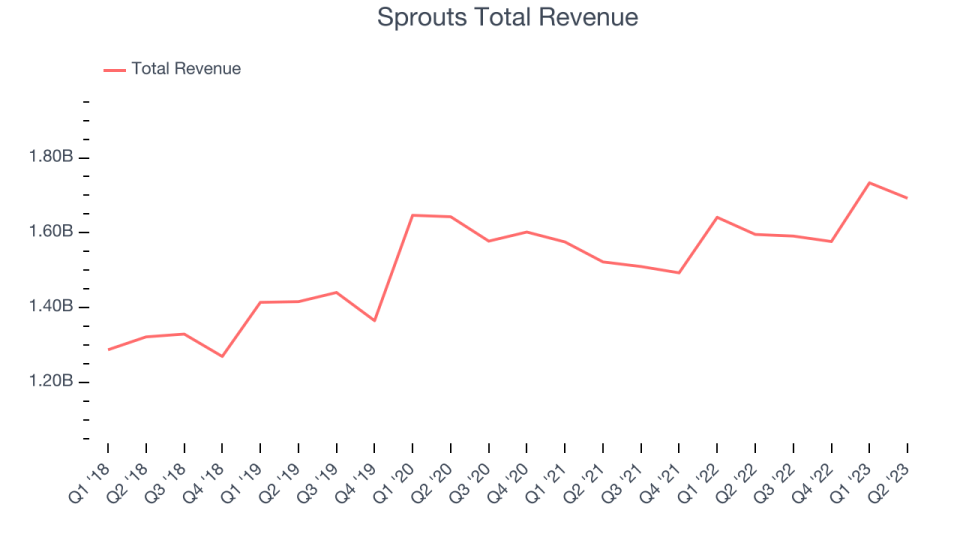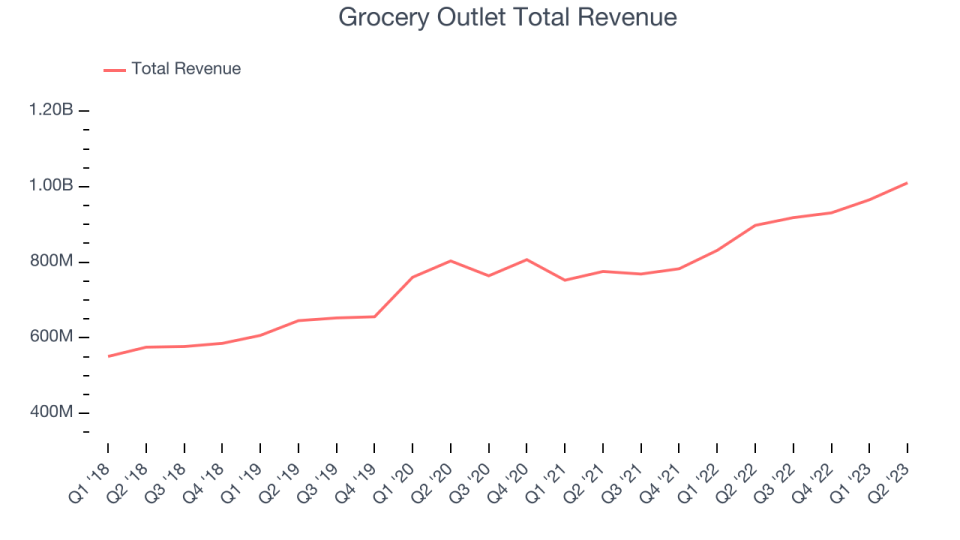Q2 Rundown: Sprouts (NASDAQ:SFM) Vs Other Non-Discretionary Retail Stocks

Wrapping up Q2 earnings, we look at the numbers and key takeaways for the non-discretionary retail stocks, including Sprouts (NASDAQ:SFM) and its peers.
Food is non-discretionary because it is essential for life (maybe not those Oreos?), so consumers naturally need a place to buy it. Selling food is a notoriously tough business, as the costs of procuring and transporting oftentimes perishable products and operating stores fit to sell these products can be high. Competition is also fierce because the alternatives are numerous. While online competition threatens all of retail, grocery is one of the least penetrated because of the nature of the product. Still, we could be one innovation or one startup away from a paradigm change in non-discretionary retail.
The 8 non-discretionary retail stocks we track reported a weaker Q2; on average, revenues were in line with analyst consensus estimates, while on average next quarter revenue guidance was 0.92% above consensus. Tech stocks have been hit the hardest as investors start to value profits over growth and while some of the non-discretionary retail stocks have fared somewhat better than others, they have not been spared, with share prices declining 9.05% since the previous earnings results, on average.
Sprouts (NASDAQ:SFM)
Playing on the secular trend of healthier living, Sprouts Farmers Market (NASDAQ:SFM) is a grocery store chain emphasizing natural and organic products.
Sprouts reported revenues of $1.69 billion, up 6.06% year on year, in line with analyst expectations. It was a decent quarter for the company, with revenue and EPS exceeding analysts' estimates. It was also good to see Sprouts decrease its full-year capex guidance
"We are encouraged by another solid quarter, as we further establish Sprouts as a go-to healthy specialty food retailer," said Jack Sinclair, chief executive officer of Sprouts Farmers Market.

The stock is up 13.4% since the results and currently trades at $43.38.
Read our full report on Sprouts here, it's free.
Best Q2: Grocery Outlet (NASDAQ:GO)
Due to its differentiated procurement and buying approach, Grocery Outlet (NASDAQ:GO) is a discount grocery store chain that offers substantial discounts on name-brand products.
Grocery Outlet reported revenues of $1.01 billion, up 12.5% year on year, beating analyst expectations by 3.47%. It was a strong quarter for the company, with an impressive beat of analysts' revenue estimates. EPS blew past analysts' expectations this quarter, driven by strong growth in same-store sales (which beat analysts' estimates by a wide margin). The company also raised its revenue, same-store sales, gross margin, adjusted EBITDA, and EPS guidance for the full year.

Grocery Outlet achieved the strongest analyst estimates beat and fastest revenue growth, but had the weakest full year guidance update among its peers. The stock is down 18.1% since the results and currently trades at $27.13.
Is now the time to buy Grocery Outlet? Access our full analysis of the earnings results here, it's free.
Weakest Q2: Dollar General (NYSE:DG)
Appealing to the budget-conscious consumer, Dollar General (NYSE:DG) is a discount retailer that sells a wide range of household essentials, groceries, apparel/beauty products, and seasonal merchandise.
Dollar General reported revenues of $9.8 billion, up 3.93% year on year, missing analyst expectations by 1.19%. It was a weak quarter for the company, with revenue and EPS unfortunately missing analysts' expectations. Gross and operating margins declined year on year. Additionally, the company lowered full year guidance across the board, with a particularly jarring reduction in EPS outlook.
The stock is down 34.4% since the results and currently trades at $103.4.
Read our full analysis of Dollar General's results here.
Costco (NASDAQ:COST)
Designed to be a one-stop shop for the suburban consumer, Costco (NASDAQ:COST) is a membership-only retail chain that sells groceries, apparel, toys, and household items, often in bulk quantities.
Costco reported revenues of $78.9 billion, up 9.5% year on year, beating analyst expectations by 1.25%. It was a decent quarter, with the company surpassing analysts' revenue and EPS expectations, even though the beat was relatively small. On the other hand, all-important same store sales growth missed slightly, driven by underperformance in the US.
The stock is up 2.28% since the results and currently trades at $566.15.
Read our full, actionable report on Costco here, it's free.
Dollar Tree (NASDAQ:DLTR)
A treasure hunt because there’s no guarantee of consistent product selection, Dollar Tree (NASDAQ:DLTR) is a discount retailer that sells general merchandise and select packaged food at extremely low prices.
Dollar Tree reported revenues of $7.33 billion, up 8.23% year on year, beating analyst expectations by 1.67%. It was a mixed quarter for the company, with the company lifting its full-year revenue guidance and topping analysts' revenue expectations this quarter, driven by strong same-store sales growth. On the other hand, its operating margin was much lower than expected.
Dollar Tree pulled off the highest full year guidance raise among the peers. The stock is down 24.7% since the results and currently trades at $107.19.
Read our full, actionable report on Dollar Tree here, it's free.
Join Paid Stock Investor Research
Help us make StockStory more helpful to investors like yourself. Join our paid user research session and receive a $50 Amazon gift card for your opinions. Sign up here.
The author has no position in any of the stocks mentioned
